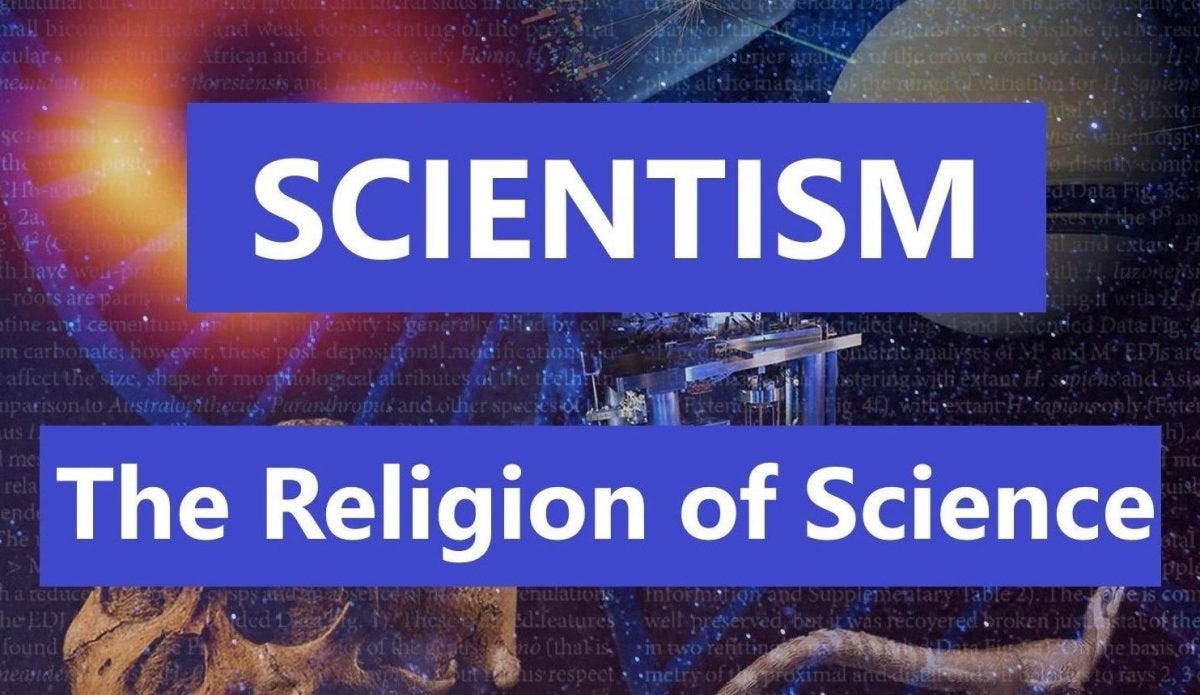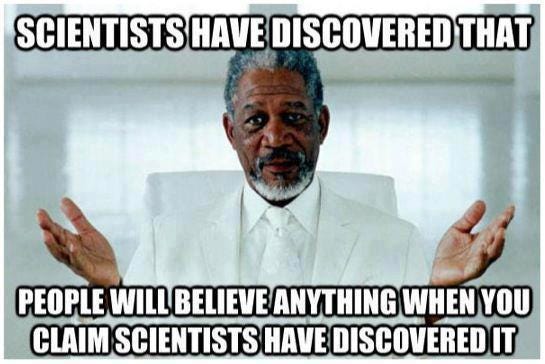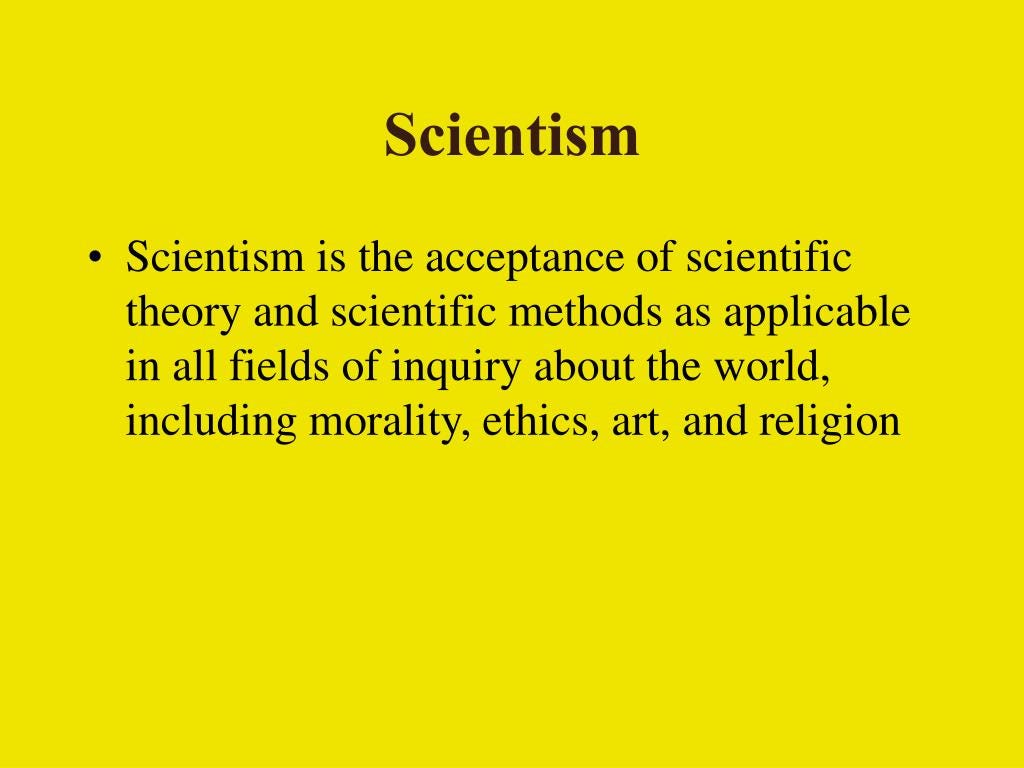$cientism and its Totalising agenda
A religious framework, with a 'Divine Right to Rule' imperative. No one is 'anti-science'. We should however, be 'anti-Scientism'.
Scientism
Scientism refers to ‘science’, being elevated as a religious cult, in which ‘naturalistic science’ is the only explanation for anything in life, and the only truth. All other religions, cults, dogmas and beliefs are to be dismissed and persecuted by the Church of Science. Obeisance to the gospels of ‘science’, articulated and enunciated through its apostles and priests is the primary objective for any human. Through ‘science’ we achieve knowledge and salvation.
This is what is being sold. Does it make any sense? First some terms used within ‘The Science’ which can help us understand ‘Scientism’.
· A priori: A priori knowledge is independent from any experience. Examples include mathematics, tautologies and deduction from pure reason. This is the basis of much ‘science’.
· A posteriori: Conclusions drawn from experimentation which can include various types of logic and inferences.
· Inductive logic: Drawing a conclusion by looking at a specific event, then generalizing from that event. Example, my cat is a good jumper. All cats are good jumpers.
· Deductive logic: Moving from a general observation and conclusion to a specific conclusion. All cats are good jumpers (at least the ones I have seen). My cat must also be a good jumper.
· Ontological: A metaphysical and philosophical view on the reality of being. Existential questions on ‘being’, or what constitutes reality for a being. We see ontology now in mathematics.
· Metaphysics: Above natural physics and naturalist science, a philosophy and world view explaining the world around us. Much of science is premised on metaphysical views.
We list the above terms to emphasise that much of ‘science’ is a priori reasoning combined with metaphysics. There is also never a single ‘scientific’ method. You can use a mixture of inductive and deductive logic linked to aposteriori experimentation. It is preferable of course when performing real science to use mechanical experimentation (aposteriori) and from that fabricate a conclusion premised on empirical fact.
Most of ‘The Science’ now ignores aposteriori experimentation and empiricism. It is mostly models, mathematics and lapidary (polishing) experimentation to prove a contrived conclusion. The Corona plandemic and its unending propaganda around ‘safe and effective vaccines’ is one obvious example. Evolution, cosmology and psychology are examples of unsubstantiated expressions of apriori-inductive-ontological rationalising and are therefore not scientific.
Metaphysics
Much of what is called ‘Science’ is metaphysics, or an ontological explanation of phenomena. The ‘Philosophy of Science’, or the underlying worldviews which lead to a priori conclusions, through inductive logic not based on experimentation, is not often discussed.
Postulate 1: The merger between science, premised on an investigation of natural phenomena and ontological metaphysics, or the worldviews which shape what is expected when natural phenomena are investigated, is called ‘Scientism’.
Postulate 2: Scientism is closely aligned with power, money and philosophy.
There is never one way to ‘discover’ ‘science’. This was well known and discussed long before Roger Bacon and the Schoolmen in the 13th century. In the 17th century the ‘Enlighteners’ offered little that was novel or new in reality. We can read the same in the ancient Greeks, the Scholastics and other philosophers and naturalists. Physics and scientific methods were not invented in the 17th century.
Even ‘science’ applied to ‘economics’ was old hat. Adam Smith for example never invented concepts explaining a ‘free market’, you can read a very detailed exposition of markets and prices in the 14th to 17th century writings and real-world investigations by Spanish theologians. Because they are Spanish, and even worse Catholic, you won’t hear anything about them. All hail Apostle Smith.
We know that Galileo’s purported triumphs never occurred or were mirrored if not pre-empted by others. An exception would be his observations of the moons of Jupiter. As Pierre Duhem proved, physics can be dated back to the School at Chartres circa 1140 and even beyond. Various theorems around Relative motion predate Einstein by some 600 years. Mechanical proofs of the Earth’s movement are still missing, a fact known from the 16th century, and this was the great impetus for Einstein, yet Copernican theory is accepted at face value as a starting point. Wouldn’t you need to first verify the starting point before using it as point of departure? What if the ‘axis of evil’ showing that our solar system is at the centre of the universe is true?
Science is not Scientism
There are some remarkable natural and physical scientific insights of course, including aspects of Newton’s codification of motion (much of it wrong however), or the dense and largely impenetrable electro-magnetic calculations of Maxwell-Clerk the dour Scots Christian which led to many inventions which have defined our society. Microbiology is a revelation of complexity and prescriptive design, an insight into a world we barely comprehend. Apparently people believe that their brain, with 80 billion neurons, each arranged with circa 7.000 connections, can self-assemble. The micro-world does not support that view nor does it support the macro-view of Relativity.
In most physical domains ‘The Science’ is unsettled and buffeted by flux and confusion. Quantum mechanics which disproves Relativity suffers from many issues as does the inanity of string theory or even the basic idea of electrons. Which electron theory do you want – Thomson’s or Bohr’s? We follow Bohr’s ‘postulates’ which have never been proven to exist. What if the speed of light is wrong? What if space time, is different than Earth time? What if human time is divorced from Earth and cosmic time? What if the creation story of Evolution has no merit? It advocated by the ancient Greeks, and the Roman Lucretius, though rejected by Aristotle and dismissed by the medieval Schoolmen due to a lack of evidence. No evidence exists today to support Darwin’s fervid fantasies.
Yet in most domains we are taught that the ‘science is settled’ and all that is missing is a grand unifying theory of ‘everything’ which puts the complexity of our existence into a simple digestible pill we can all swallow, or a simple time-effective religiosity and mass we can attend, without impacting our viewing of entertainment, or the celebration of our favorite sports team. Keep the rituals and rites in the Church of the Holy Science quick and easy. Take the blue pill Neo.
Philosophy and Teams
What is rarely transparent in our modern world is what we see with sports teams and their clothing. With sports clubs we know their name, their league, and who pays them and how much. We need to apply the same to ‘The Science’ and any ‘experts’ within any domain. In particular we would like to know the following:
· What is the name of the team you are on, meaning what philosophical club do you belong to or what is your religious affiliation (atheism is a religion of course and usually a violent, virulent one).
· Why do you support this team, what is in it for you?
· Who is the ‘coach’ and management and what is your ‘role’ on the team?
· Who is the financial sponsor?
· How much do you make per season or per play?
· If you are not paid, what benefits do you receive?
· What is your objective as an individual and as a team member?
Curious minds would like some information on the above.
How did Einstein die with millions in net worth when he ‘taught’ and philosophized for a living? How about Hawking’s large estate? Or that of Oppenheimer or Fermi? How did Neil Armstrong die in 2015 with a U$15 million estate when he left NASA shortly after he made his film and never acted again? Who is funding Neil Tyson de Grasse and Dickie Dawkins and distributing their sermons and books? Please bring the wizards and their money out from behind the curtain into full view.
A Totalising Philosophy
There is very little real, objective, mechanical Science. It is now Scientism. Scientism is in essence a totalising-philosophical elaboration of a point of view, or system of belief, based on scientific claims, methods and observation. The history of Scientism is unfortunately not well known nor investigated. This means that in many domains of modern science, especially in areas such as medicine, climate, biology and cosmology, the postulates or ‘laws’ of Scientism are marketed as self-evident truths when they are simply philosophical explanations, financed by vested interests and not mechanical-scientific constructs.
An outcome of Scientism is the ‘totalising’ of ‘science’, the imposition of centralized beliefs and dogma; and a rejection of inquiry or doubt. It extends to all domains in our society, including those within and and those external to naturalism. I would equate this with a totalising-religio-cult or a paradigm of a ‘right to rule’ through scientistic decrees. Pigliucci summarised this nicely:
“A totalizing attitude that regards science as the ultimate standard and arbiter of all interesting questions; or alternatively that seeks to expand the very definition and scope of science to encompass all aspects of human knowledge and understanding” (Pigliucci 2013, p.144).
In other words, you can only believe and follow what Scientism demands to be true. This includes all non-scientific domains. For example, being told by ‘Scientific American’ that if you ‘follow science’ you must vote for Kamala Harris who supports ‘real science’. A more idiotic claim is hard to imagine. But there it is. If you are ‘smart’ you vote Communist.
Materialism
It is obvious that in almost all key naturalist domains, including medicine, biology, climate and cosmology, we have moved away from real science to Scientism based on materialism. Materialism is the belief that only natural processes can explain everything, including the universe, our planet, ourselves and everything we see around us. These materialist philosophies are usually represented by the creation-genesis stories of The Big Bang in cosmology and Evolution in biology. Both are foundational to the Scientism project. Entirely logical and rational demands for aposteriori proof, observational evidence, or even the debating of different viewpoints are anathema and never tolerated.
Most people are unaware of the philosophical premises and state financing which is the foundation of materialist Scientism and which forces domains such as cosmology and biology down certain paths of inquiry. Indeed, these two domains of philosophical materialism are related, given that biological materialism picks up where cosmological materialism ends. Both are unscientific and quite wrong. There is no proof that the Big Bang occurred, and there is absolutely no proof that immaterial matter can ‘evolve’ over endless time to become you.
Philosophy
We need to divorce the philosophical edifice of Scientism from real science. By openly and transparently identifying what is philosophy versus what is mechanical-natural science, and by using philosophy to legitimately raise doubts about the dogma that only ‘science’ has a divine right to rule on matters of reality or ‘truth’, we can help clarify the limits and boundaries of real science against that of philosophy.
In other words, philosophy and science both matter, and both have roles to play, but when there is an admixture of the two leading to Scientism, society is firmly on the path to a ‘totalising’ concept of science and what can be accepted as ‘true’ and what will be rejected. Scientism is pace Haack, a threat to ‘science’ itself:
“Scientism is an exaggerated kind of deference towards science, an excessive readiness to accept as authoritative any claim made by the sciences, and to dismiss every kind of criticism of science or its practitioners as anti-scientific prejudice” (Haack 2007, p.47).
Myths
Haack was spot on. Consider the following.
The Galileo myth is just that – a myth. Yet is still used today as a foundational event for modern science, even though much of it is apocryphal. Einstein called himself primarily a ‘philosopher’ and not a scientist. Darwin never performed a single experiment to prove macro-evolution and promised a ‘second book’ with all the proofs that his ‘Origins’ referenced, but this work was never issued. Michael Ruse a noted evolutionary biologist has named Evolution a religion. Lawrence Krauss an atheist cosmologist openly admits that much of astrophysics and the interpretation of data is to reduce mankind and our place in the universe through enshrining the philosophical (and misanthropic) ’Copernican principle’. The data says otherwise much to Krauss’ consternation.
Richard Dawkins, the clown jester in the court of ‘The Science’, and other naturalists cannot explain how DNA can self-form, but tautologically claim that since we exist it did. Crick a co-discoverer of DNA and its double-helix, gave up on naturalist explanations for DNA and resorted to panspermia. No one in science has a plausible explanation for the origins of the universe or life, yet the discredited and disproven Big Bang is accepted as ‘settled science’. Stephen Hawking marketed multi-verses without being able to explain the origins of our current universe. Much of what Einstein philosophized in his Relativity theologies is simply incoherent and wrong including E=MC2 (4 reasons why E=MC2 is wrong). And on it goes.
Blind Belief
For the hoi polloi however, the philosophies listed above are accepted in-toto, without criticism, including those in the domains of medicine, vaccines, naturalism, cosmology and biology. We therefore have the merger of philosophy, religion, scientific techniques, technology, money, marketing, endless science propaganda and group think. This is what Scientism really entails, a religio-cult of power and control. If Scientism and its distortive effects are not addressed it will lead to a dark place for the human race.
We saw this during the Medical Nazism of the Corona plan-demic where ‘The Science’ demanded lockdowns, face diapers and poison stabbinations. All based on a fake flying ‘virus’ from a bat. Many of us are quite sure that flying viruses don’t exist and if they do, they are dead material, not mobile plagues and unable to affect our immune system. The coordination of the Corona-Medical Nazism was global and involved all possible actors across various geographies and levels of government including the G20, UN and WHO. The resulting death, injury and misery was and will be, ignored.
Corona was the most signficant event after 9-11 in the recent past. If you want to know about someone, ask them about 9-11 and Corona. Their replies will tell you much more about them than their CV.
Real science is necessary. No one is ‘anti-science’. That is akin to being ‘anti-breathing’. Scientism is however unnecessary and evil. It is rational to be ‘anti-Scientism’.
====End
Bias
Trained in both science and technology, I have spent about 30 years investigating mechanical science and philosophy, creating applications, publishing material and performing experiments. This includes deep dives into such topics as embryology, genetics, Relativity, electromagnetism and light. I build applications and data platforms in real life. The world is rather binary in my view. Pierre Duhem, Stanley Jaki, Thomas Kuhn, David Berlinski, Thomas Nagel and Paul Feyerabend amongst many others were famous and persistent critics of Scientism. They are largely ignored. They need to be resurrected and their apposite ideas burnished.
====
Some related sources on this topic
Berlinkski, David. The Devil’s Delusion, 2009 (has a good crack at Darwin), Berlinski is always a good read, though his maths usually leave me behind in a puddle of tears.
Chalmers, A. F. (2013). What is this thing called science? Indianapolis: Hackett Publishing.
Conant, J. B. (1951). Science and common sense. New Haven: Yale University Press.
Crick, F. (1996). Visual perception: rivalry and consciousness. Nature, 379(6565), 485–486.
De Ridder, J. (2014). Science and scientism in popular science writing. Social Epistemology Review and Reply Collective, 3(12), 23–39.
Gasparatou, R. (2008). Species of philosophical naturalism, science and scienticism. The International Journal of Humanities, 6(4), 27–35.
Haack, S. (2007). Defending science within reason: between scientism and cynicism. New York: Prometheus Books.
Harris, S. (2011). The moral landscape: how science can determine human values. New York: Simon and Schuster.
Hughes, A. L. (2012). The folly of scientism. The New Atlantis, 37, 32–50.
Kuhn, T. S. (2012). The structure of scientific revolutions. Chicago: University of Chicago Press.
Lawson, A. E. (1995). Science teaching and the development of thinking. Belmont: Wadsworth Pub.
Numbers, R. L., & Kampourakis, K. (2015). Newton’s apple and other myths about science. Cambridge: Harvard University Press.
Stanford, P. K. (2016) Naturalism without Scientism. In K.J. Clark (Ed.), The Blackwell Companion to Naturalism (pp. 91–108). New Jersey: John Wiley & Sons.
Stenmark, M. (2001). Scientism: science, ethics and religion. Aldershot: Ashgate.
Van Woudenberg, R. (2011). Truths that science cannot touch. Philosophia Reformata, 76(2), 169–186.
Wittgenstein, L. (1953). Philosophical investigations. Oxford: Blackwell.
Wootton, D. (2015). The invention of science: a new history of the scientific revolution. London: Penguin Random House.









